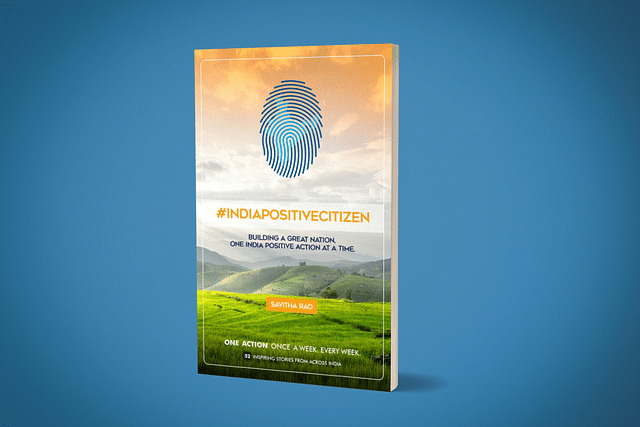
The Power Of One: How To Unleash The Individual’s Power To Do Good Everyday
The right way to read the book is not to finish it off in one session, but to read one page a day, ponder over how you can internalise the message, and do something to change the world around you.
Howsoever small your effort, every bit helps.
#IndiaPositiveCitizen. Savitha Rao. Wings Publication. Self-published. Website: www.indiapositivecitizen.com. Special Price Rs 349. Pages 192.
Over the years, we have become a nation of obstructive busybodies and whining crybabies. If someone wants to do something (create jobs or incomes), there is a legion of “conscientious” objectors saying why it must not be done for some reason or the other (example: the opposition to freeing farmers from the tyranny of APMC monopolies because other conditions are not ideal).
If ordinary things don’t work, we would like to blame everyone but ourselves for it. We will vote crooks and jailbirds to power, but when they do nothing to alleviate our lot, we will blame them for not doing their jobs (“Sab saale chor hain”; “Sab mile huey hain”).
But, as Cassius tells Brutus in Shakespeare’s Julius Caesar, “The fault, dear Brutus, is not in our stars, but in ourselves…”. We may not have the power to move mountains or end all corruption in one go, but we do have the power to remove that mound of garbage near our homes or develop the patience to do things the right way instead of paying speed money to get a driver’s licence.
This is the elevating premise of Savitha Rao’s #IndiaPositiveCitizen, a collection of stories of everyday goodness in everyday acts of ordinary citizens. A self-published book in Covid days, Rao tells us, through innumerable short stories that seldom run to more than a page, that every individual can make a difference. No one needs anyone’s permission to do the good deed. From refusing to use plastic bags for carrying your daily veggies to not throwing refuse on the roads, change has to begin from the individual before the powers that be start taking citizens seriously.
One very short chapter in the book, Power of One, undergirds the philosophy behind the book, which is that one committed individual is more important than a legion of naysayers. This point was illustrated in the Mahabharata, where both Duryodhana and Arjuna rush to Shri Krishna for help in the coming war. Shri Krishna offered Arjuna first choice, of either taking his army, or his own personal assistance, and Arjuna chose the latter. We know how Shri Krishna single-handedly enabled the Pandavas to win the war without picking up arms himself. It was the Power of One scoring over a mercenary army.
A former professional in international marketing, Savitha Rao says she wanted to become an entrepreneur at one point. Her epiphanic moment came when she read a book by Anita Roddick (creator of BodyShop), Business As Unusual, which told her that she could be in any business and yet do good. This prompted her to start a campaign “India Kuch Kar” some years ago, to get people off their backsides and do something for the country in whatever small way they could. Another source of inspiration for Rao to write the book was Narendra Modi’s Mann ki Baat.
But if you are under the impression that #IndiaPositiveCitizen is going to be some kind of lazy afternoon read, forget it. In fact, it is meant to goad you to do something, not just enjoy the feel-good stories contained in it.
In #IndiaPositiveCitizen, you will read micro stories of everyday goodness in people. You will hear about K Kamalathal, who ran an idli shop at the age of 80 in Vadivelampalayam, with the sole purpose of feeding people healthy food at a nominal price of Re 1. Sure, it was a small business for her, but reducing Kamalathal’s daily deed to a business would do her injustice. There is no mention of the love she serves along with idlis to the people who come to her. Rao does not want you to read the story and merely wallow in the feel-good part of it. Can you think of cooking a little extra and feed someone who needs it?
Then there are stories about an engineering professional who gifts tree certificates for occasions like marriages, where the gift is about an investment made to an organisation that plants trees on your behalf and takes care of them. Another story relates to a gentleman who offered to buy a blind woman a samosa; but when he did so, she did not eat it. It went into her bag, and probably saved up for her children. He bought her another samosa so that she herself could eat. This is less a story about the large-hearted samosa financier, and more a pointer to the fact that something good can be done with so little effort on a daily basis.
It is not my intention to tell you every story in this book, but to make a larger point: nobody is incapable of doing good, even if it is only to bring one small smile to a small child or senior citizen once a week or even once a month.
The right way to read the book is not to finish it off in one session, but to read one page a day, ponder over how you can internalise the message, and do something to change the world around you. Howsoever small your effort, every bit helps.